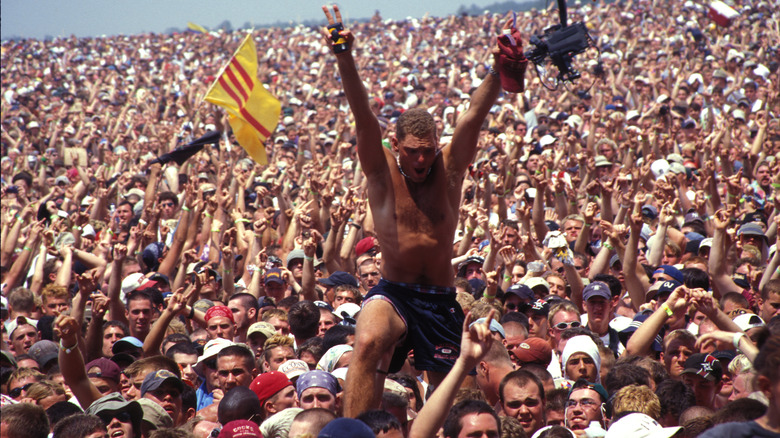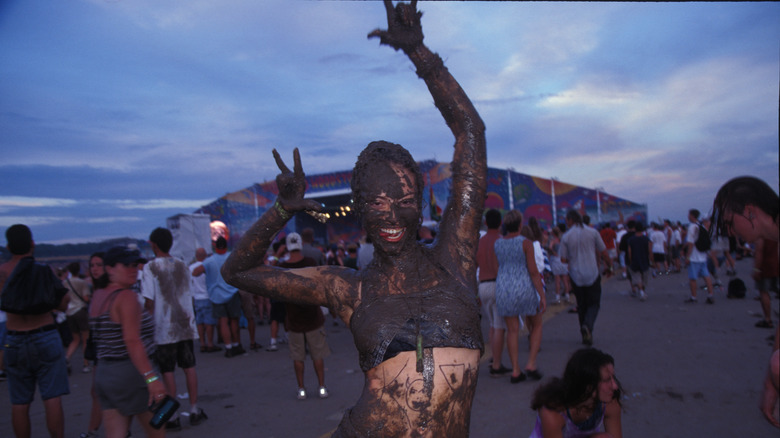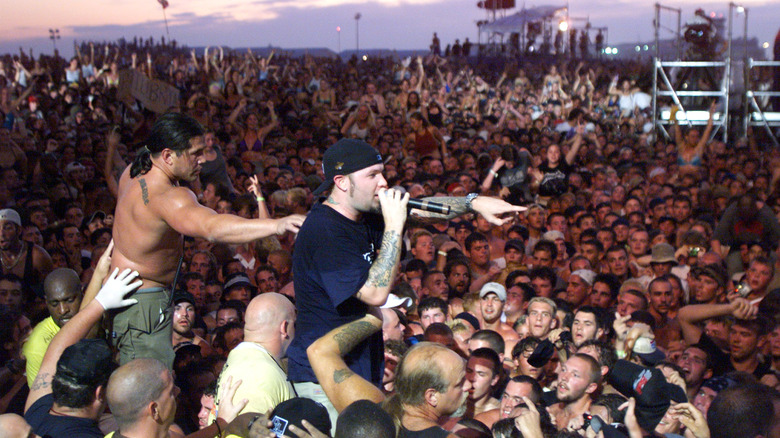What Woodstock 99: Peace, Love, And Rage Didn't Tell You
More than 50 years after the three-day Woodstock Music Festival launched from a farm in Bethel, New York, on August 15, 1969, it continues to fascinate. So much so that the event inspired future large-scale concerts, including the 30th anniversary celebration in 1999. The Rome, New York, version at the decommissioned Griffiss Air Force Base failed to the point that Rolling Stone and others refer to it as "the day the Nineties died" because of its capitalist emphasis (like $4 water bottles), a flawed lineup schedule, sweltering weather, and poor organization that created an aggressive crowd that turned violent.
A new HBO documentary, "Woodstock '99: Peace, Love, and Rage" (view the trailer on YouTube) explores how the three-day quest for unity, counterculture and good music went awry, leading to three people's deaths, 44 arrests and 10 reported sexual assaults (via Den of Geeks). It premiered on the 22nd anniversary of the event's start date (July 23, 1999), about the same moment the band Korn appeared on stage (also on YouTube), according to Cinema Blend.
The documentary's behind-the-scenes footage showcases how the event "played out much more like a horror film," as director Garret Price (2019's "Love, Antosha") described it in the film's narration (via The Guardian). Price offers more context about the concert while dismantling an oft-held belief that the musicians were solely responsible for the chaos, rather than the fault of other factors (via Cinema Blend). But who exactly is responsible for the disaster that "Woodstock '99" became?
A documentary that fosters debate
Pinpointing one element for blame never happens in the film, which explores several reasons why Woodstock '99 failed so spectacularly. The documentary tries to find answers using interviews with event organizers (Michael Lang and John Scher), talent (like The Roots' Tariq "Black Thought" Trotter, Moby, and Jewel) and concert attendees, reported Collider, and often provides tantalizing anecdotes. For example, "There is a sixth sense that you develop when you spend your life going to venues. We got off the bus and I was like, 'Something is not right,'" Moby said in a documentary interview, quoted by Den of Geeks.
The question of responsibility is also addressed by critics such as Wesley Morris and Maureen Callahan, who analyze what happened and how the event continues to effect culture. Whether or not it symbolized a turning point in American history and became a "flashpoint for burgeoning white toxic masculinity," as the Warner Media synopsis said, can be debated long after watching the doc. But as The Guardian points out, the film doesn't provide just one answer to who caused the disastrous concert. Rather, it shows how several factors introduced the chaos that infiltrated the entire event. "It's a mixture of the culture, and the way the festival was planned, and people falling victim to the mythology of Woodstock, that everything just works out into this idyllic thing," explained Price in the documentary, quoted by The Guardian. "It just all mixed together resulted in this cacophony of craziness."
Some missing voices
One flaw of the documentary, according to IndieWire, is it lacks diversity. DMX's performance, for example, contains a moment where he gets the predominately Caucasian audience to shout the N-word, but no interviews from Black attendees about it are included. Additionally, only one female attendee is questioned about "Woodstock '99," and the events that unfolded. This makes the film seem "too male-centric," said the website.
Some festival participants declined interview requests, such as Kid Rock, The Red Hot Chili Peppers, and Fred Durst from Limp Bizkit (pictured above), reported The Thrillist. "We had conversations, and ultimately he decided he didn't want to participate," Price said to the publication. "He's kinda moved on from that. I respect and understand that. But at the same time, I wanted to give him a platform to tell his side of the story ... They got a lot of pushback throughout their career because of this, and I don't think that's entirely fair. There's a lot of factors that lead to the downfall of this festival."
The documentary is part of a new Music Box series under Bill Simmons' Ringer Films that explores pivotal musical artists throughout the fall, and will include five more films such as a behind-the-scenes look at Alanis Morissette's "Jagged Little Pill" album in 1995 and a piece on the late rapper DMX's life, among other topics, according to HBO.
"Woodstock '99: Peace, Love, and Rage" premiered on HBO and HBO Max on July 23.


